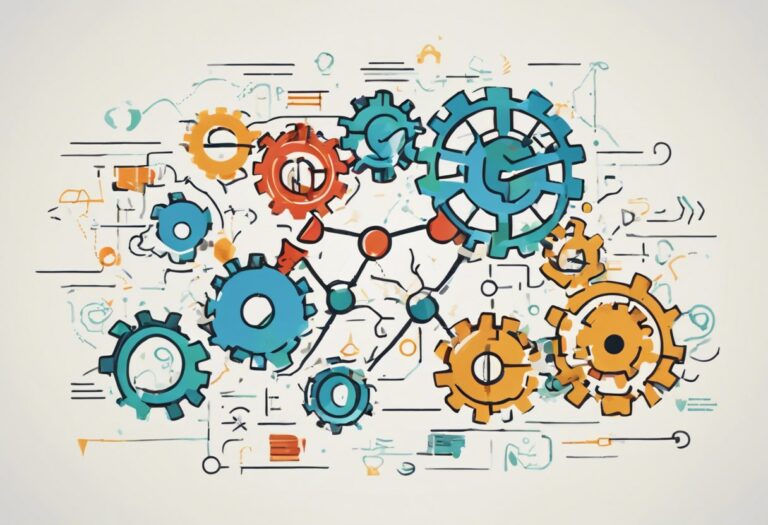What Jobs Will AI Replace & Which Are Safe in 2024

The world of work is changing fast, and Artificial Intelligence (AI) is a big reason why. For example, salespeople are using AI to analyze sales calls faster. This is just one way AI is making jobs different than they used to be.
Some jobs might be replaced by machines and AI, while others will stay safe and keep needing human touch. We’re going to look at ten jobs that AI could replace, and ten jobs that are likely to stay around, based on findings from a big study called The Future of Employment, and information from Will Robots Take My Job. This will help us understand where the world of work is heading and how we might fit into the future job landscape.
10 Jobs AI Can Replace
Artificial Intelligence (AI) is getting really good at doing some jobs that people used to do. Here are ten jobs where AI might take over.
1. Telemarketers
Future of Employment Study Likelihood: 99%
Will Robots Take My Job? Likelihood: 100%
Telemarketers call people to sell things over the phone. AI can do this job because it can follow scripts and doesn’t get tired or frustrated. Plus, AI can handle lots of calls at once and even personalize the conversation a bit, making it really efficient.
2. Bookkeeping Clerks
Future of Employment Study Likelihood: 99%
Will Robots Take My Job? Likelihood: 100%
Bookkeeping clerks keep track of the money that a business makes and spends. AI is great at this because it’s really good with numbers and can quickly do math without making mistakes. AI can also work all the time, which helps keep the books up to date.
3. Compensation and Benefits Managers
Future of Employment Study Likelihood: 96%
Will Robots Take My Job? Likelihood: 41%
These managers work out how much to pay employees and what kind of benefits they should get. While AI can analyze data to suggest pay scales and benefits packages, the lower likelihood from “Will Robots Take My Job?” suggests that human judgment and negotiation skills are still important in this field.
4. Receptionists
Future of Employment Study Likelihood: 96%
Will Robots Take My Job? Likelihood: 93%
Receptionists welcome visitors and answer phones. AI can replace this job because it can easily handle scheduling, answer common questions, and direct calls. Plus, AI doesn’t need breaks or days off.
5. Couriers
Future of Employment Study Likelihood: 94%
Will Robots Take My Job? Likelihood: 95%
Couriers deliver packages and messages. With drones and self-driving cars becoming more common, AI can take over this job. It’s faster and can work all the time, making it very efficient.
6. Proofreaders
Future of Employment Study Likelihood: 84%
Will Robots Take My Job? Likelihood: 100%
Proofreaders check writing for mistakes. AI can do this job well because it’s good at spotting errors in spelling, grammar, and punctuation. AI tools keep getting better at understanding context, which helps them catch more mistakes.
Also, now it’s much more common for content creators to use an AI writer for SEO content creation. This makes the content much more correct from the beginning, which means proofreaders don’t need to do as much work or sometimes none at all.
7. Computer Support Specialists
Future of Employment Study Likelihood: 65%
Will Robots Take My Job? Likelihood: 52%
These specialists help people with computer problems. AI can replace this job because it can diagnose and solve many common tech issues faster than a human can. AI chatbots can also help multiple people at once.
8. Market Research Analysts
Future of Employment Study Likelihood: 61%
Will Robots Take My Job? Likelihood: 40%
Market research analysts study what people want to buy. AI can do parts of this job, like analyzing data to see trends. However, understanding human emotions and reasons for buying still needs a human touch.
9. Advertising Salespeople
Future of Employment Study Likelihood: 54%
Will Robots Take My Job? Likelihood: 52%
Advertising salespeople sell ad space. AI can replace parts of this job because it can analyze data to target ads better and even automate the selling process. However, building relationships with clients still benefits from a human touch.
10. Retail Salespeople
Future of Employment Study Likelihood: 92%
Will Robots Take My Job? Likelihood: 66%
Retail salespeople help customers find products in stores. Online shopping and AI chatbots can do much of this job. For example, a chatbot for eCommerce can provide personalized recommendations and handle customer inquiries at any time, making shopping easier without needing a human salesperson.
10 Jobs AI Can’t Replace
Even though AI is really smart, there are some jobs it just can’t do as well as humans. Here’s a list of ten jobs that are pretty safe from being taken over by AI.
1. Human Resources Managers
Future of Employment Study Likelihood: 0.55%
Will Robots Take My Job? Likelihood: 14%
Human Resources Managers work with people a lot. They hire, train, and help employees. AI isn’t great at understanding human emotions or making complex decisions that depend on those emotions. This job needs a lot of empathy and understanding, which AI can’t provide.
2. Sales Managers
Future of Employment Study Likelihood: 1.3%
Will Robots Take My Job? Likelihood: 30%
Sales Managers plan and direct the sales of products or services. They need to understand what customers want, motivate their team, and plan strategies. These tasks require creativity and emotional intelligence, which AI lacks. Plus, building relationships with clients is key, something AI can’t do very well.
3. Marketing Managers
Future of Employment Study Likelihood: 1.4%
Will Robots Take My Job? Likelihood: 18%
Marketing Managers create campaigns to sell products or services. They need to understand what makes people interested and how to get their attention. This job requires a lot of creativity and insight into human behavior, things AI isn’t good at.
4. Public Relations Managers
Future of Employment Study Likelihood: 1.5%
Will Robots Take My Job? Likelihood: 20%
Public Relations Managers help create a good image for companies. They deal with the media and public to build positive relationships. This job needs someone who can think creatively and handle unexpected questions or situations, which is hard for AI.
5. Chief Executives
Future of Employment Study Likelihood: 1.5%
Will Robots Take My Job? Likelihood: 0%
Chief Executives make big decisions that shape the whole company. They need to think about the future, make plans, and lead people. These tasks need a deep understanding of business and people, something AI can’t replicate.
6. Event Planners
Future of Employment Study Likelihood: 3.7%
Will Robots Take My Job? Likelihood: 8%
Event Planners organize meetings, parties, and other events. They need to be creative, solve problems quickly, and work with many different people. AI isn’t good at dealing with many last-minute changes or understanding what people enjoy.
7. Writers
Future of Employment Study Likelihood: 3.8%
Will Robots Take My Job? Likelihood: 49%
Writers create stories, articles, and content. Writing requires creativity, an understanding of human emotions, and the ability to engage readers. AI can write basic stuff, but only humans can create truly engaging and deep content that touches people’s hearts.
8. Software Developers
Future of Employment Study Likelihood: 4.2%
Will Robots Take My Job? Likelihood: 39%
Software Developers design and build computer programs. They must solve complex problems, think creatively, and understand users’ needs. While AI can help, coming up with new ideas and solutions is a human skill.
9. Editors
Future of Employment Study Likelihood: 5.5%
Will Robots Take My Job? Likelihood: 45%
Editors review and improve writing. They need a deep understanding of language, style, and audience. Editing isn’t just about fixing errors; it’s about making writing better and more engaging, which requires human insight.
10. Graphic Designers
Future of Employment Study Likelihood: 8.2%
Will Robots Take My Job? Likelihood: 34%
Graphic Designers create visual content, using art and technology to communicate ideas. This job requires creativity, a sense of style, and an understanding of what looks good, which AI can’t fully grasp.
How to Future-Proof Your Career
Wondering how to make sure your job will still be around in the future, even with all the new technology and AI? Here are some tips to keep your career on track.
- Keep Learning: Things change fast, especially when it comes to jobs and technology. Always try to learn new things. This can be new skills for your job, or something totally different that interests you.
- Be Adaptable: It’s really important to be able to change and adjust. If your job starts to change because of AI or technology, being flexible and open to learning how to work with new tools can make a big difference.
- Improve Your Soft Skills: Soft skills include talking to people, solving problems, and working well in a team. Computers and AI are not very good at these things, so being strong in these areas can help ensure there’s always a place for you at work.
- Understand Technology: Even if your job isn’t about technology, knowing a bit about how computers and AI work can be really helpful. It can make you more valuable at your job and open up new opportunities.
- Stay Creative: AI has trouble with creativity and coming up with new ideas. Jobs that require creative thinking are more likely to be safe from being replaced by AI. So, think outside the box and be innovative.
- Focus on Human Interaction: Jobs that require a lot of personal interaction, like teaching, nursing, or selling, are harder for AI to do. Being good at working with people can be a big advantage.
By following these tips, you can make sure your career is ready for the future, no matter what new technology comes along.
Final Thoughts
As AI becomes a bigger part of our world, some jobs will change a lot, and some might even disappear. But there are also many jobs that AI won’t be able to do as well as humans can.
The key to a successful career in the future is to keep learning, stay flexible, and focus on the skills that machines can’t easily copy, like creativity and working well with others. By preparing now, you can make sure you’re ready for whatever changes come your way.






